10 Nutritious High-Carb Foods That Should Be Part of Your Diet

If you hear the word "carbs" and instantly think "Resist!" it's time to take another look at the most misunderstood of the three macronutrients. Blame that bad rep on the popularity of certain fad diets: "Thanks to diets like keto and Atkins, carbs have become completely misunderstood," says Marissa Meshulam, RD, of MPMNutrition. "People wind up avoiding carbs all together, which is not ideal for our guts, our brains, our energy or the sustainability of our diets." In fact, the current USDA/DHHS Dietary Guidelines for Americans recommends that we consume anywhere from 45% to 65% of our total energy for the day in the form of carbs.
“There's an automatic negative perception around carbs, just as there is an automatic positive association with protein,” says Rachael Hartley, R.D., registered dietitian and author of Gentle Nutrition. “Because of this perception, many people think that eating healthy means limiting carbohydrates, when in reality, carbs are the body's preferred source of fuel, and a valuable source of vitamins, minerals and fiber.” Meshulam adds that the brain requires carbohydrates for proper functioning.
Editor's note: Weight loss, health and body image are complex subjects — before deciding to go on a diet or change your eating habits, we invite you to gain a broader perspective by reading our exploration into the hazards of diet culture.
Scientifically-speaking, carbs are sugar molecules that get broken down into glucose or blood sugar to provide energy to cells, tissues and organs. Sources of carbs are grains, starchy vegetables, dairy and fruit. Generally, there are two types of carbs – complex carbs (found in foods like whole grains and starchy veggies) and simple (found in refined white grains and fruit). "Simple carbs quickly digest and leave us hungry after," says Meshulam. "These also can spike our insulin levels, which, over time, can create insulin resistance and fat storage." Complex carbs, however, such as beans, legumes, and whole grains, take longer to break down, leading to a steadier rise in insulin. They also fill us up longer, while avoiding the energy highs and lows, she adds.
But any kind of carb, including the less nutritious ones, offers energy and can fit into a balanced intake. “All foods serve a purpose, and even 'unhealthy' carbohydrate foods can provide benefits," says Harley.
For this list of high carb foods, we looked for nutrient-dense carbohydrates packed with vitamins, minerals and fiber — many of these contain naturally occurring sugar that will help keep your energy up.
Quinoa
This nutty-tasting little grain has become very popular of late, especially as the base for a healthy and filling bowl (add roasted veggies, chickpeas, sliced avocado, and tofu, salmon or lean chicken for a delicious meal). "Quinoa is naturally gluten-free, making it a great option for those with a sensitivity or intolerance to gluten," Meshulam points out. "In just one cup of cooked quinoa, you get 5 grams of fiber (compared with around 1 gram in rice). It also provides 8 grams of protein in that cup, making it an excellent choice for those following a plant-based diet," she adds.
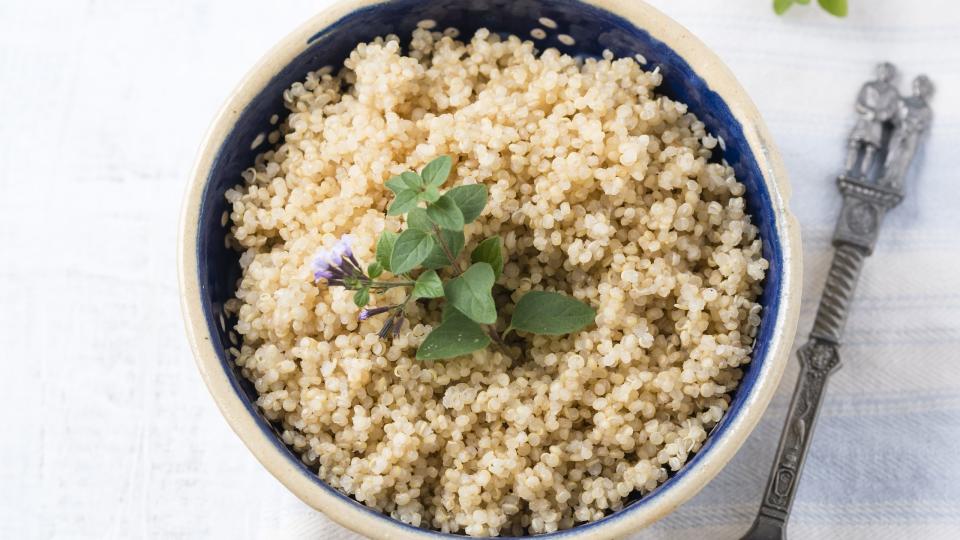
Black beans
If you keep a few cans of black beans in your pantry, you'll always have something healthy and filling to add delicious bulk to your soups, salads and chilis. Meshulam explains that these are a great source of slow carbohydrates. "Due to the fiber and protein content in black beans, your body will slowly release the sugar into your bloodstream, providing you with more steady energy than just a slice of white bread," she says.
The fiber in black beans also serves as a prebiotic, helping feed the good gut bacteria. Meshulam points out that they also contain a wide array of micronutrients, including B vitamins. Her advice: If you buy canned, be sure to rinse them off to remove any excess sodium.
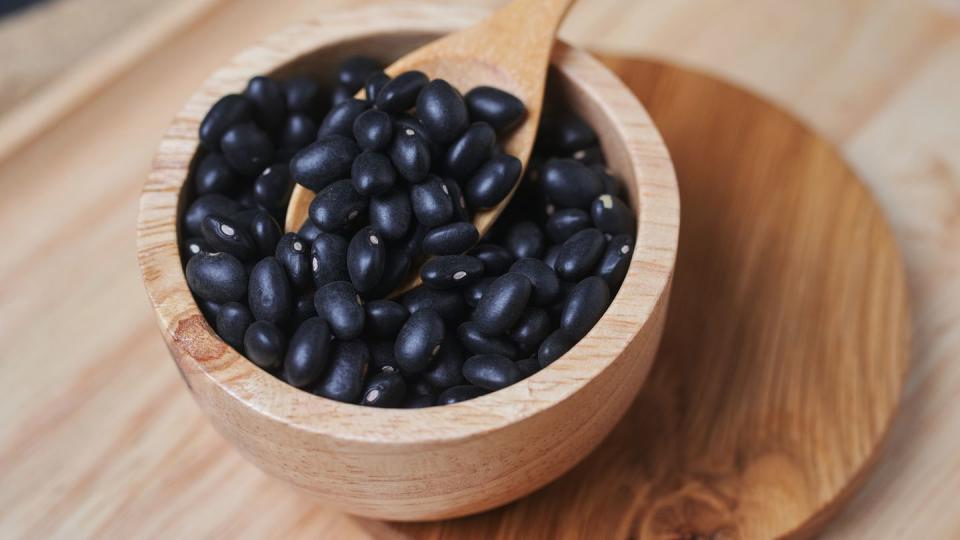
Oats
"Oats are a fabulous source of carbohydrates — they're rich in beta glucan, which is a soluble fiber most notable for lowering cholesterol," says Meshulam. Research has linked consuming oats with lowering low-density lipoprotein (LDL) cholesterol levels. Plus, the prebiotic fiber found in oats help fuel your body’s probiotics, the friendly bacteria that lives in your GI tract.
“I love oatmeal because it makes a tasty and satisfying breakfast, and also contains cholesterol-lowering, gut-friendly soluble fiber,” says Hartley.
You can include oats in your intake in a variety of ways, including overnight oats, and warm oatmeal topped with fruit and nuts or nut butter. Meshulam suggests adding protein powder, chia seeds, or hemp seeds, or adding a hard-boiled egg on the side, to get a good balance of protein and fat.
RELATED: Overnight Oats Recipes That Practically Make Themselves
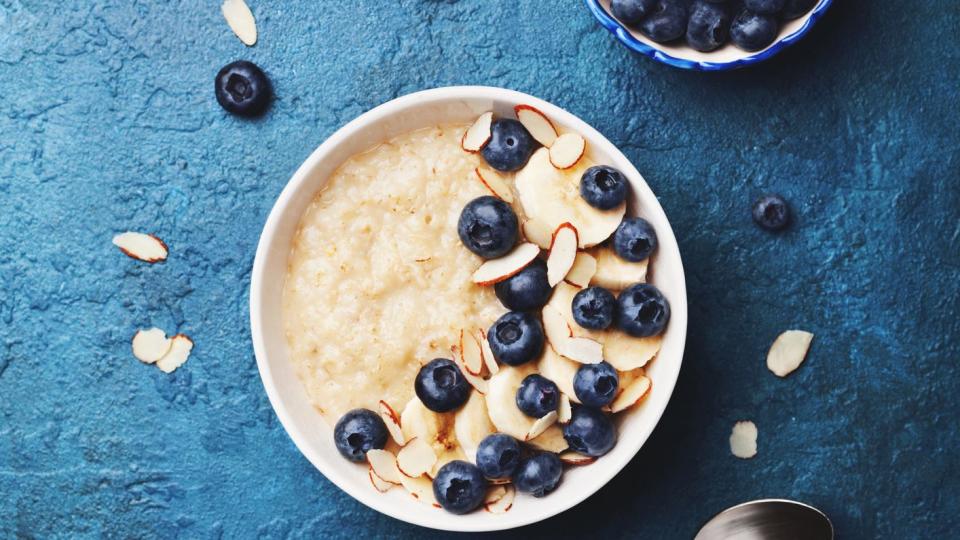
Berries
When most people think of carbs, they think grains, but fruits are good sources of complex carbs, too, and are packed with nutrients. For example, blueberries are a good source of fiber and vitamin C, and they offer other essential micronutrients like potassium and manganese.
Research also shows daily consumption of blueberries and strawberries, which contain high levels of antioxidants, may be linked to positive effects, like improving inflammation, insulin sensitivity, blood pressure and cognitive health.
Whether you opt for fresh, frozen or dried, berries offer an easy way to add pops of sweetness to meals and snacks. Try mixing them into your pancake batter or oatmeal at breakfast, including them in salads at lunch or dinner, or pairing them with nuts and chocolate for a balanced, tasty snack.

Potatoes
Thanks to their association with deep-fried and processed foods like chips and French fries, potatoes have a bit of a naughty rep, but they are actually nutrient powerhouses — they can pack up to 4 grams of plant-based protein, nearly 5 grams of fiber and 25% of the potassium you need for the day. Wondering whether you should eat white or sweet potatoes? The answer is to eat the potatoes you prefer. “Lots of people think white potatoes are unhealthy or don't contain any nutrients, but they're actually rich in the antioxidant vitamin C, potassium, and contains a nice dose of fiber,” says Hartley.
"I love making roasted potatoes earlier in the week, so the resistant starch, which serves as prebiotic fiber for our guts, has a chance to build up," says Meshulam. "I also love making a healthier potato salad, using Greek yogurt, mustard, and fresh herbs."
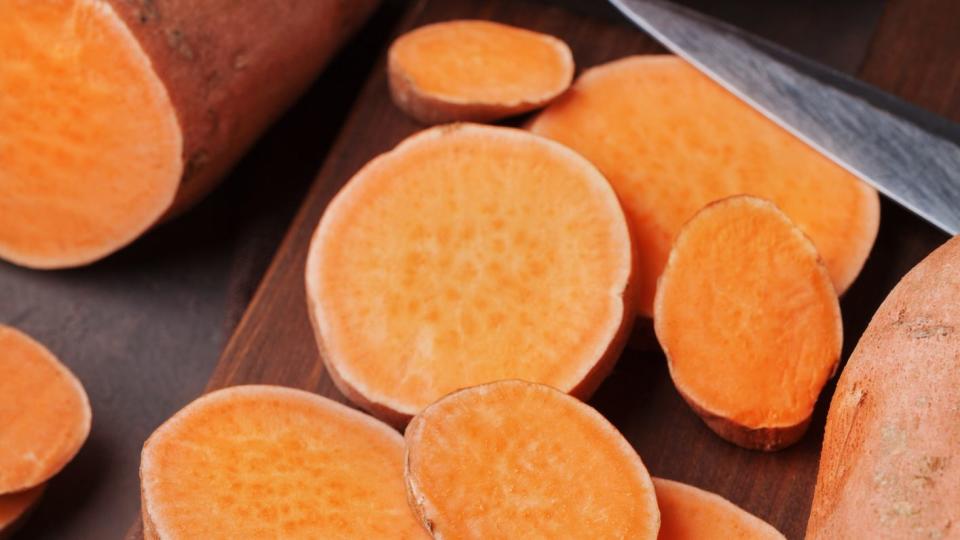
Bread
Sometimes you just want your sandwich to have the doughy bite of two pieces of bread, rather than a "healthier" lettuce wrap — and that's okay! Bread can be an easy way to meet your carb needs and benefit from other essential nutrients. All breads contain varying amounts of fiber and micronutrients like calcium and magnesium, and can be a part of a balanced diet. Whole grain versions (whole wheat, rye, pumpernickel, etc.) offer more nutrients than their refined, white counterparts. Another great choice? Sprouted grain bread, which is nutrient-dense, high in fiber, and easy to digest.
Toast a slice of your favorite bread with breakfast, dip a slice in some good quality olive oil, or try one of these delicious lunch sandwiches.
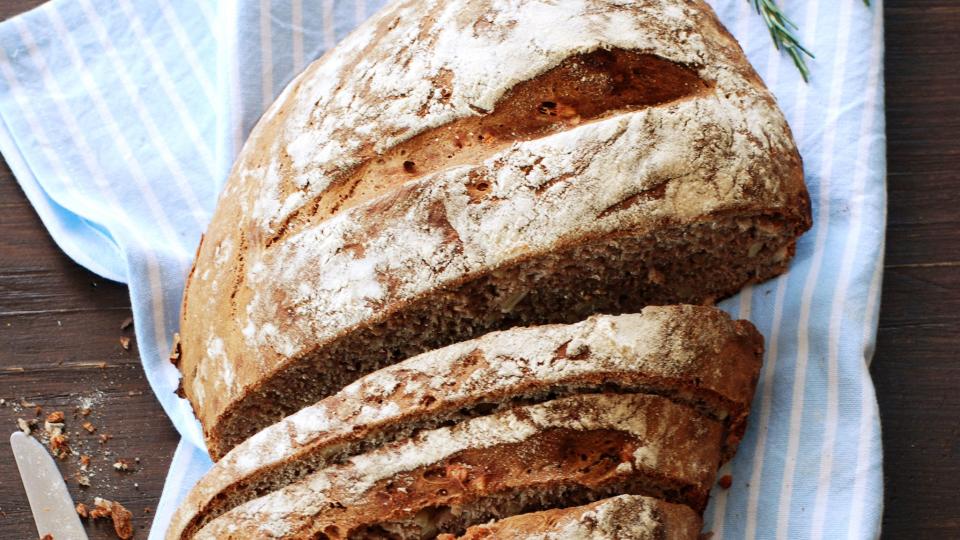
Farro
With a texture and shape somewhere between couscous and rice, farro is a highly nutritious ancient grain and nutty-tasting complex carb.
Like most grains, farro is a good source of fiber, offering about 5 grams per serving (1/4 cup dry or ½ cup cooked), or 18% of the recommended daily value (DV). Plus, it provides plant-based protein, offering about 6 grams per serving.
Farro also supplies micronutrients like non-heme iron (the type of iron found in plant-based sources) — 2 mg or 10% of the DV — per serving. You can try farro as a carb source in a burrito bowl, tossed in a salad or as a side with fish and veggies.
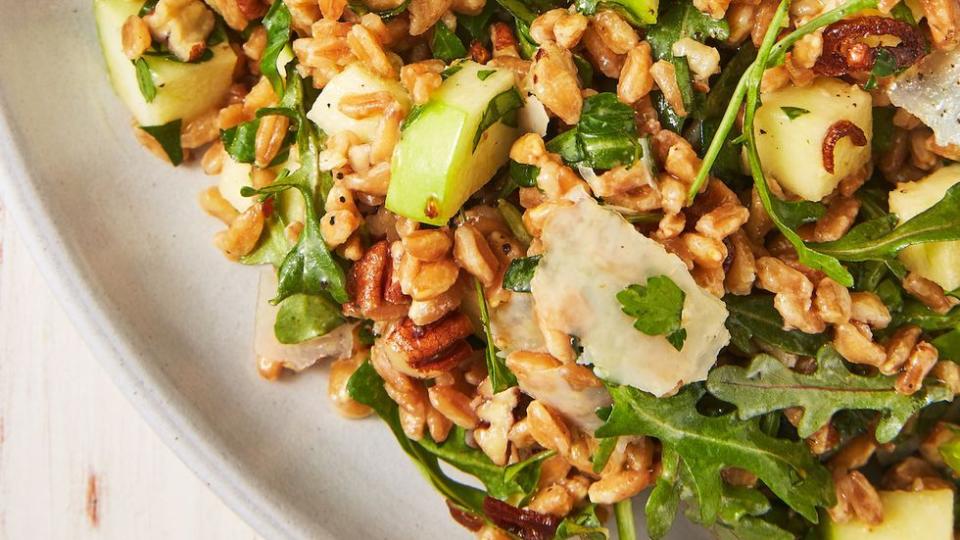
Pumpkin
As a member of the squash family, pumpkin is a starchy, nutrient-dense veggie. Other than offering complex carbohydrates, pumpkin offers the antioxidant beta-carotene, an important antioxidant for your vision and skin.
One cup of plain pumpkin purée also provides essential nutrients like fiber, vitamin A, potassium and non-heme iron.
Try mixing ½ cup into plain, Greek yogurt (with cinnamon, nutmeg and a drizzle of honey) for a protein-rich snack and enjoy it this holiday season in pumpkin pie.
RELATED: Easy Pumpkin Recipes That Are Perfect for Fall
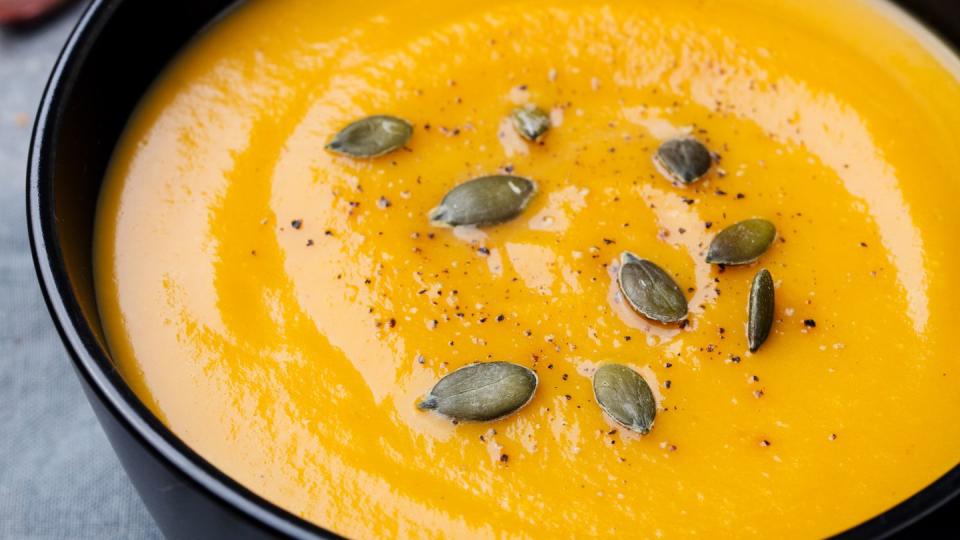
Dates
Dates are sweet, dried fruits and carb sources with essential nutrients, including fiber and micronutrients (vitamins and minerals).
Just two Medjool dates provide 3.2 grams of fiber, which is about 12% of DV. Like oats, dates contain soluble fiber, which helps to lower LDL cholesterol. They also contain insoluble fiber which helps keep the digestive system running smoothly.
Dates offer important micronutrients like calcium, B vitamins, non-heme iron, potassium, copper and magnesium. Enjoy them chopped up in salads or rice dishes, or as a satisfying snack filled with nut butter.
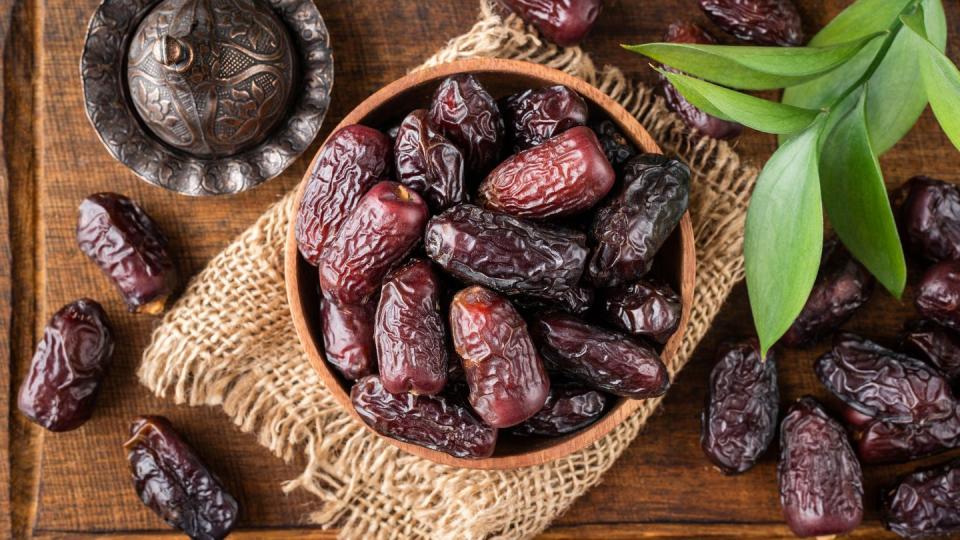
Yogurt
Along with other sources of dairy, yogurt is a carb choice that provides lactose, a naturally occurring sugar. While there are yogurts higher in protein than others (like Greek yogurt), all yogurts offer important nutrients aside from carbs.
Yogurt is a good source of bone-protecting calcium and vitamin D, and gut-balancing probiotics. One thing you'll want to be mindful of is sugar in yogurt. You should try to opt for Greek yogurts, which are naturally lower in sugar and higher in protein than regular yogurt.
Similar to our other carb picks, the best rule of thumb to follow when choosing yogurt is to go with what you like most. Have it as a little snack alone, or try yogurt in sweet-but-tart breakfasts like smoothies and parfaits, or in savory fare like dips and condiments.
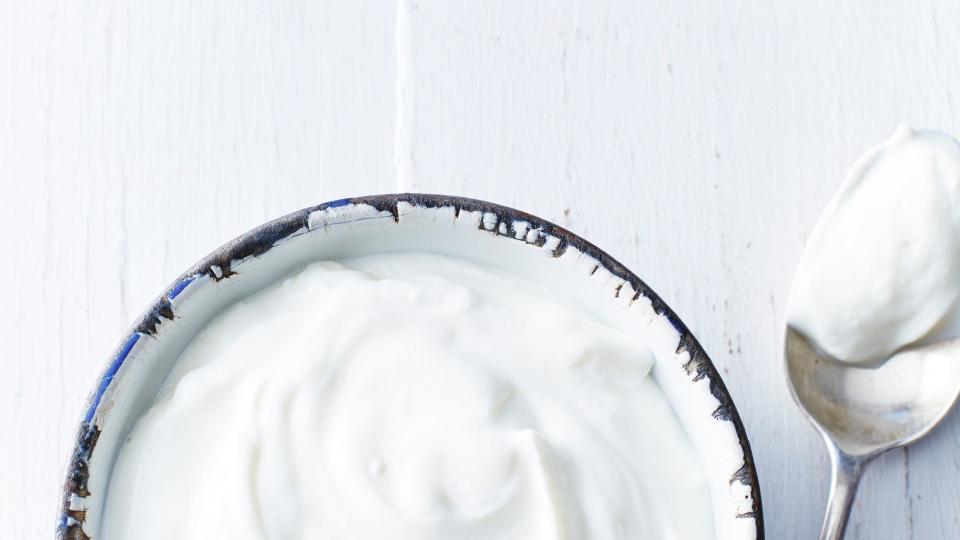
Bottom line
While some carbs may be more nutritious than others, Hartley says her key carb-related recommendation is to eat enough of them and include them regularly at meals and snacks. Otherwise, going a long period of time without carbs can lead to blood sugar instability. “Carbs are our brain's main source of fuel, so eating carbs consistently can be helpful for mood, and maintaining energy and focus,” she says.
Focus on eating the more nutritious carbs you enjoy instead of forcing yourself to eat foods you don’t like, and trust you will get a balance of nutrients with a varied intake of carb sources. Food is fuel and nourishment, but it is also so much more – food, and food traditions and experiences, can be one way to nourish ourselves emotionally. Oftentimes, carb-rich "fun" foods are significant parts of emotional eating experiences. Having a healthy relationship to food includes giving yourself permission to include all types of carbs, and enjoy joyful, adventurous and sentimental eating experiences.

You Might Also Like

